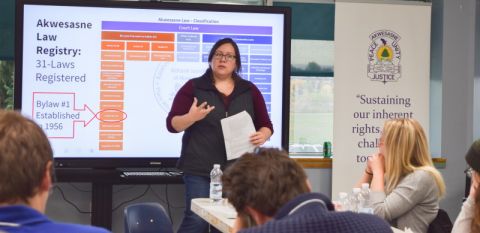
It may only be one day, but it is an eye-opening highlight of the academic year.
Recently, 40 Queen’s Law community members boarded a bus and travelled two hours north-east to the Mohawk community of Akwesasne to visit the first court by and for Indigenous Peoples in Canada. The day’s agenda included sessions on traditional dispute resolution, a community justice program panel Q&A, and – new this year – a case study on Akwesasne law.
“The annual Akwesasne trip is very important as it allows us to continue building on our relationship with the community,” says Hugo Choquette, Law’05, LLM’10, PhD’17, Aboriginal Law instructor. “We have a lot to learn from Akwesasne, and in turn we can provide some help and support to the community where it is needed.”
The morning session was intended to ground the visitors in the Haudenosaunee culture, helping them to understand the worldview which has established the Indigenous legal traditions they were learning about. As they moved through the agenda, the teachings became more practical and culminated in a case study looking at a decision of the Akwesasne court in which an individual was subject to restorative justice after failing to live up to their community responsibilities.
One of the day’s most poignant moments were the remarks of Jonel Beauvais, a Mohawk woman who spoke about her incarceration experience and her efforts to help others as they are released from prison.
“She has turned her experience as someone convicted and imprisoned for a serious crime into such good, and she is able to translate that experience into such a passionate message about justice and humanity,” says Dean Mark Walters, Law’89. “We may have gone to Akwesasne to learn about Indigenous law and justice, and we did learn so much, but we came away learning about the non-Indigenous system of law and justice too – and what we learned should trouble us and motivate us.”
Near the end of the day, Akwesasne facilitator Kyrie Ransom showed the attendees a prime example of a challenge this new court faces. Many of their laws were born from the community’s goal to act as an independent self-determining nation in a “two-row wampum” relationship with Canada, rather than federal authority. This aspiration for self-determination makes the community a prime research location for PhD candidate Sarojini Persaud.
“Akwesasne is an excellent example of a First Nation that has not adopted Canada’s tax system,” says Persaud, who is studying that issue. “Learning about their governance and community laws was very informative. I plan to use Akwesasne to make my argument that First Nations should not enter into Tax Administration Agreements with the Canada Revenue Agency.”
Noting other, more subtle learnings besides the community’s legal workings, Persaud particularly appreciated the practice of always commencing events by giving thanks.
The annual trip was co-organized by representatives of the Mohawk Council of Akwesasne and Ann Deer, Indigenous Recruitment and Support Coordinator at Queen’s Law.
By Phil Gaudreau